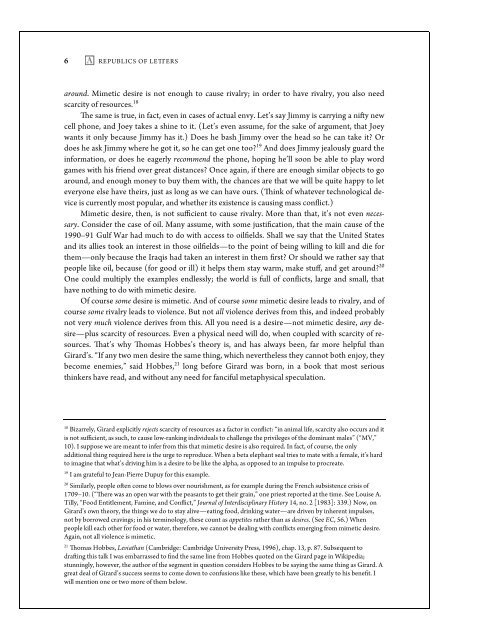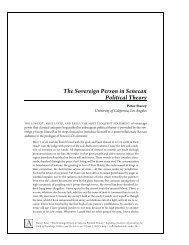Deceit, Desire, and the Literature Professor: Why Girardians Exist
Deceit, Desire, and the Literature Professor: Why Girardians Exist
Deceit, Desire, and the Literature Professor: Why Girardians Exist
Create successful ePaper yourself
Turn your PDF publications into a flip-book with our unique Google optimized e-Paper software.
6 REPUBLICS OF LETTERS<br />
around. Mimetic desire is not enough to cause rivalry; in order to have rivalry, you also need<br />
scarcity of resources. 18<br />
The same is true, in fact, even in cases of actual envy. Let’s say Jimmy is carrying a nifty new<br />
cell phone, <strong>and</strong> Joey takes a shine to it. (Let’s even assume, for <strong>the</strong> sake of argument, that Joey<br />
wants it only because Jimmy has it.) Does he bash Jimmy over <strong>the</strong> head so he can take it? Or<br />
does he ask Jimmy where he got it, so he can get one too? 19 And does Jimmy jealously guard <strong>the</strong><br />
information, or does he eagerly recommend <strong>the</strong> phone, hoping he’ll soon be able to play word<br />
games with his friend over great distances? Once again, if <strong>the</strong>re are enough similar objects to go<br />
around, <strong>and</strong> enough money to buy <strong>the</strong>m with, <strong>the</strong> chances are that we will be quite happy to let<br />
everyone else have <strong>the</strong>irs, just as long as we can have ours. (Think of whatever technological device<br />
is currently most popular, <strong>and</strong> whe<strong>the</strong>r its existence is causing mass conflict.)<br />
Mimetic desire, <strong>the</strong>n, is not sufficient to cause rivalry. More than that, it’s not even necessary.<br />
Consider <strong>the</strong> case of oil. Many assume, with some justification, that <strong>the</strong> main cause of <strong>the</strong><br />
1990–91 Gulf War had much to do with access to oilfields. Shall we say that <strong>the</strong> United States<br />
<strong>and</strong> its allies took an interest in those oilfields—to <strong>the</strong> point of being willing to kill <strong>and</strong> die for<br />
<strong>the</strong>m—only because <strong>the</strong> Iraqis had taken an interest in <strong>the</strong>m first? Or should we ra<strong>the</strong>r say that<br />
people like oil, because (for good or ill) it helps <strong>the</strong>m stay warm, make stuff, <strong>and</strong> get around? 20<br />
One could multiply <strong>the</strong> examples endlessly; <strong>the</strong> world is full of conflicts, large <strong>and</strong> small, that<br />
have nothing to do with mimetic desire.<br />
Of course some desire is mimetic. And of course some mimetic desire leads to rivalry, <strong>and</strong> of<br />
course some rivalry leads to violence. But not all violence derives from this, <strong>and</strong> indeed probably<br />
not very much violence derives from this. All you need is a desire—not mimetic desire, any desire—plus<br />
scarcity of resources. Even a physical need will do, when coupled with scarcity of resources.<br />
That’s why Thomas Hobbes’s <strong>the</strong>ory is, <strong>and</strong> has always been, far more helpful than<br />
Girard’s. “If any two men desire <strong>the</strong> same thing, which never<strong>the</strong>less <strong>the</strong>y cannot both enjoy, <strong>the</strong>y<br />
become enemies,” said Hobbes, 21 long before Girard was born, in a book that most serious<br />
thinkers have read, <strong>and</strong> without any need for fanciful metaphysical speculation.<br />
18 Bizarrely, Girard explicitly rejects scarcity of resources as a factor in conflict: “in animal life, scarcity also occurs <strong>and</strong> it<br />
is not sufficient, as such, to cause low-ranking individuals to challenge <strong>the</strong> privileges of <strong>the</strong> dominant males” (“MV,”<br />
10). I suppose we are meant to infer from this that mimetic desire is also required. In fact, of course, <strong>the</strong> only<br />
additional thing required here is <strong>the</strong> urge to reproduce. When a beta elephant seal tries to mate with a female, it’s hard<br />
to imagine that what’s driving him is a desire to be like <strong>the</strong> alpha, as opposed to an impulse to procreate.<br />
19 I am grateful to Jean-Pierre Dupuy for this example.<br />
20 Similarly, people often come to blows over nourishment, as for example during <strong>the</strong> French subsistence crisis of<br />
1709–10. (“There was an open war with <strong>the</strong> peasants to get <strong>the</strong>ir grain,” one priest reported at <strong>the</strong> time. See Louise A.<br />
Tilly, “Food Entitlement, Famine, <strong>and</strong> Conflict,” Journal of Interdisciplinary History 14, no. 2 [1983]: 339.) Now, on<br />
Girard’s own <strong>the</strong>ory, <strong>the</strong> things we do to stay alive—eating food, drinking water—are driven by inherent impulses,<br />
not by borrowed cravings; in his terminology, <strong>the</strong>se count as appetites ra<strong>the</strong>r than as desires. (See EC, 56.) When<br />
people kill each o<strong>the</strong>r for food or water, <strong>the</strong>refore, we cannot be dealing with conflicts emerging from mimetic desire.<br />
Again, not all violence is mimetic.<br />
21 Thomas Hobbes, Leviathan (Cambridge: Cambridge University Press, 1996), chap. 13, p. 87. Subsequent to<br />
drafting this talk I was embarrassed to find <strong>the</strong> same line from Hobbes quoted on <strong>the</strong> Girard page in Wikipedia;<br />
stunningly, however, <strong>the</strong> author of <strong>the</strong> segment in question considers Hobbes to be saying <strong>the</strong> same thing as Girard. A<br />
great deal of Girard’s success seems to come down to confusions like <strong>the</strong>se, which have been greatly to his benefit. I<br />
will mention one or two more of <strong>the</strong>m below.



